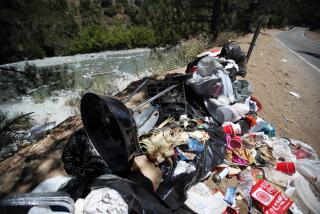CONSERVATION AND ECOLOGY
- Share via
Weather watchers reported this month that 1997 was the hottest year of this century. That led scientists to warn about negative effects from global warming. Environmental groups also are concerned about destruction of the rain forests, extinction of wildlife and depletion of our energy supply. Why all the fuss? Because our natural resources are limited. For example, less than 1% of the water on Earth is fit for drinking, and without water, life as we know it could not exist. To learn more about conservation and ecology, use the direct links on The Times’ Launch Point Web site: https://www.latimes.com/launchpoint/
LEVEL ONE
Poor Richard’s Energy Almanac: Learn from Ben Franklin about energy conservation and how people used energy in the 1740s, compared with how we use it today. Play energy games, and print out a copy of the Declaration of Energy Independence. https://www.energy.ca.gov/education/ben/ben-html/benfranklin.html
U.S. EPA Explorers Club: Do you know how to wash water? Can you solve the mystery of the missing ozone? Learn what you can do to help preserve the environment--for example, how recycling can stop a garbage gremlin’s life of grime. Includes a wide variety of information and activities on conservation. https://www.epa.gov/kids/
E Patrol: Use a clickable map to find out about endangered animals on a particular continent. Learn energy-saving tips for every room in the house. And test your environmental knowledge with the E-Patrol quiz. https://www.sprint.com/epatrol/
LEVEL TWO
American Museum of Natural History Expedition Endangered: Learn about endangered animals and habitats as well as the activities that have put them in peril. Understand what conservation biologists mean when they say that a species is endangered or vulnerable. https://www.amnh.org/Exhibition/Expedition/Endangered/
The Environment Coolmine Community: Students created this introduction to acid rain, water pollution, the greenhouse effect and alternative energy sources. Read how the ozone layer protects us from harmful ultraviolet rays and why it’s important that substances harmful to the ozone are limited. https://www.schwaben.de/home/kepi/enviro.htm
Commonly Recycled Materials: A guide to help you recycle materials at home or at school. Learn what the different symbols on plastic containers mean and what types of paper can be recycled. https://www.obviously.COM/recycle/guides/common.html
LEVEL THREE
Science & the Environment: A collection of newspaper and magazine articles on environmental issues. Topics include wildlife conservation, land-use policies, clean air, alternative energy sources, climate changes and recycling. https://www.cais.com/publish/stories/chapters.htm
Biodiversity and Conservation: This online book by UCI professor Peter J. Bryant details the range of activities that affect habitats and wildlife. Learn about the U.S. Endangered Species Act of 1973. https://darwin.bio.uci.edu/~sustain/bio65/Titlpage.htm
Save Our Earth and Make a Difference: Did you know that the energy from one recycled aluminum can could power a television for three hours? Read compelling reasons for recycling and more about ecological issues. https://library.advanced.org/11353/
Launch Point is produced by the UC Irvine department of education, which reviews each site for appropriateness and quality. Even so, parents should supervise their children’s use of the Internet. This week’s column was designed by Camelia Mihele, J.P. Mathot, Ann Kim, Stan Woo-Sam and Anna Manring.
EXPLORER’S QUEST
The answer to this Internet quiz can be found in the sites above.
QUESTION:
How many different species of animals and plants are considered endangered in the United States?
Clue: See U.S. EPA Explorers Club
Tell Us What You Want To Know
Got a paper or project coming up? Just curious about something? Send us a topic, and we’ll consider it for a future Launch Point column. Write to us at The Times Orange County, 1375 Sunflower Ave., Costa Mesa, CA 92626. E-mail us at educ@latimes.com or leave a phone message at (714) 966-4550.
Answer to last week’s Quest:
Rosa Parks was arrested in 1955 for refusing to give up a bus seat for a white passenger.
Browse ENFO Information Leaflets https://kola.dcu.ie/~enfo/pubindex.htm
YouthCan 1997 https://www.nyu.edu/projects/youthcan/1997/






